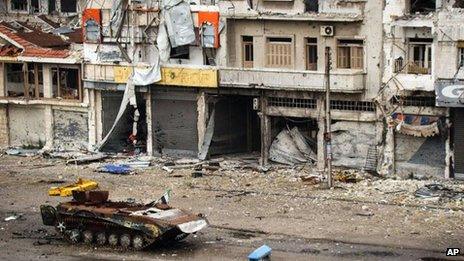UN resolution calls for Syria political transition
- Published

The UN General Assembly has adopted a resolution calling for a political transition in Syria and condemning the government's use of heavy weapons.
The resolution, which is not binding, passed easily, although a similar one last year received more support.
Russia was fiercely opposed to the text, which it said was unbalanced and failed to address adequately atrocities allegedly committed by rebel groups.
The resolution was drafted by Arab states who have championed the rebels.
Syria said the initiative went against the recent diplomatic efforts by the US and Russia to find a political solution to the two-year-old conflict, which the UN says has left at least 80,000 people dead.
'One-sided'
The General Assembly reiterated its call for a political transition, which it said represented "the best opportunity to resolve the situation... peacefully".
The resolution also expressed outrage at the "rapidly increasing death toll", and strongly condemned the Syrian government's use of heavy weapons and the "widespread and systematic gross violations of human rights and fundamental freedoms".
The text called for urgent financial support to neighbouring countries, which are hosting 1.5 million refugees, and highlighted the "dire situation" of the 4.25 million internally displaced people.
A solid majority of 107 states voted to adopt the resolution, but that contrasted with 133 that supported a similar resolution in August, reports the BBC's Barbara Plett at the UN in New York. There were 12 votes against and 59 abstentions on Wednesday.
The text was drafted by Arab states supporting the rebels, and critics said it overwhelmingly favoured the opposition.
Footage purporting to show the attack was posted on the internet
But our correspondent says the drafters watered down the language, backing the coalition as simply "effective representative interlocutors for a political transition".
This was necessary, said the French UN representative, to encourage attempts by the US and Russia to convince both the government and opposition to negotiate a settlement.
Prison assault
However the Russian deputy permanent representative, Alexander Pankin, said the resolution was "clearly a one-sided text" and would undermine the peace initiative.
"The full responsibility for the tragic development of events is put on the shoulders of the Syrian government. And this, in spite of obvious facts... about the illegal actions of the armed opposition, including terrorist actions."
But US deputy permanent representative Rosemary DiCarlo argued that the resolution was "consistent" with the US-Russian initiative.
"Adopting this resolution will send a clear message that the political solution we all seek is the best way to end the suffering of the people of Syria," she said.
Earlier, there was heavy fighting outside the main prison in the northern Syrian city of Aleppo after rebel fighters attempted to storm it.
Opposition sources said the rebels had launched an attack on the prison, which holds some 4,000 inmates, using suicide car bombs to try to blast holes in its walls.
Government forces said they had fought back, wounding and killing many of the rebels.
An independent MP, Besher Yazji, told the BBC that the rebels were trying to destroy Aleppo and the capital, Damascus, as they had already destroyed the city of Homs.